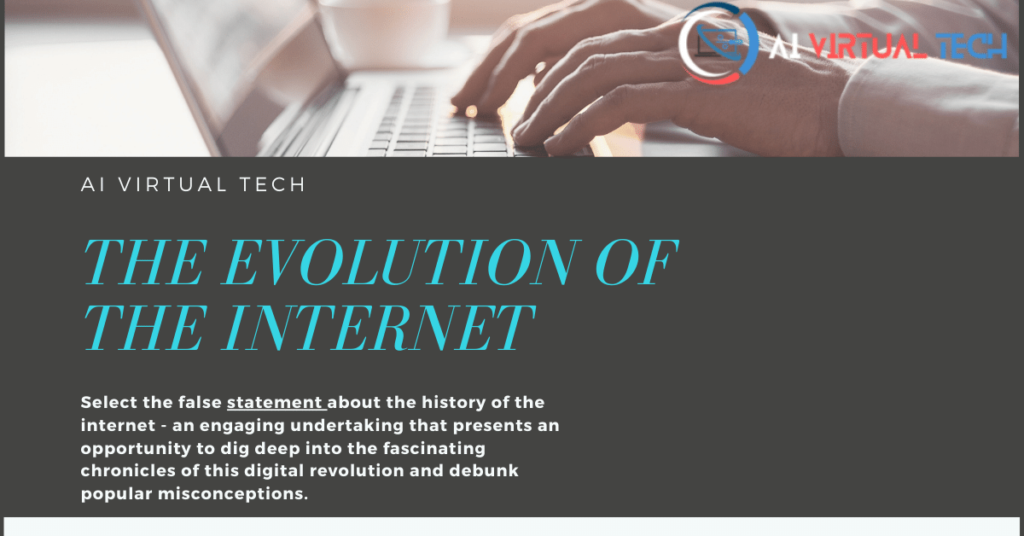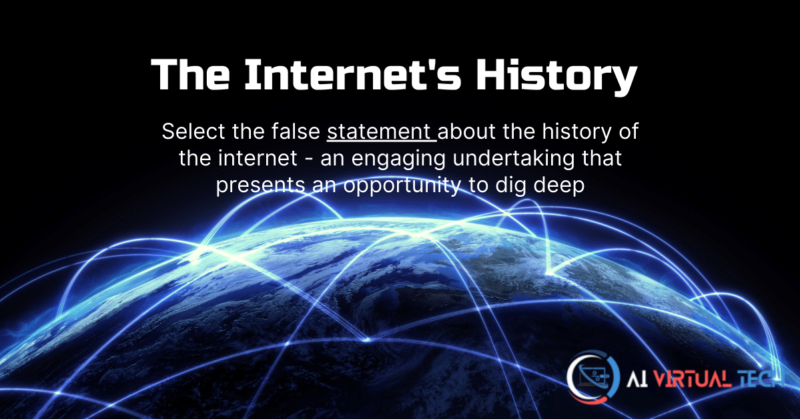Select the false statement about the history of the internet – an engaging undertaking that presents an opportunity to dig deep into the fascinating chronicles of this digital revolution and debunk popular misconceptions.
Introduction
- The history of the internet is a riveting tale of innovation, collaboration, and unprecedented technological advancement.
- However, not all statements circulating about this topic hold authenticity. Let’s shine a light on some common claims and uncover the misinformation.
- It wasn’t until the 1980s that the internet as we know it today began to take shape, with the development of protocols such as TCP/IP that allowed for the seamless transfer of data across different networks. This laid the foundation for the global network of interconnected computers that we rely on today.
- Despite its widespread use and impact on various aspects of our lives, misconceptions about the abound.
- In reality, the internet is the result of the collaborative efforts of countless researchers, engineers, and visionaries from around the world. It was a collective endeavor that required the contributions of many to bring it to fruition.
Birth in the 1960s
The 1960s witnessed the inception of the internet, marked by the establishment of ARPANET by the US Department of Defense. This groundbreaking development laid the foundation for the Internet as we know it today.
While there were significant advancements in computer technology during that era, the true birth of the occurred in the 1960s with the creation of ARPANET.
ARPANET paved the way for the interconnected network of computers that eventually evolved into the Internet.
Its establishment represented a monumental leap forward in communication technology and set the stage for the digital revolution that would follow in the coming decades.
Invention by a Single Entity
- Contrary to popular belief, no single entity or individual can lay claim to inventing the internet. It was a collaborative effort involving numerous scientists, engineers, and programmers over a decade.
- The internet’s creation was the result of the collective contributions and dedication of countless individuals.
- Scientists conducted groundbreaking research, engineers developed key technologies, and programmers wrote the code that made it all possible.
- This collaborative spirit and shared knowledge paved the way for the Internet as we know it today.
- It is important to dispel the fallacy of a sole inventor, as it undermines the true nature of the internet’s development.
- Recognizing the collaborative nature of this achievement honors the hard work and ingenuity of the many people involved.
- The internet stands as a testament to the power of collaboration and the ability to achieve great things through collective effort.
Survival of Nuclear Attacks
The myth that the internet was designed to survive a nuclear attack is widespread. In reality, its design aimed to facilitate robust and reliable communication between computer networks. This misconception has been debunked numerous times.
Its architects envisioned a decentralized system that could adapt and route around failures, ensuring the flow of information even in the face of network outages or technical glitches.
While it is true that the internet’s decentralized structure enhances its resilience, its primary goal was to enable efficient and effective communication among computers and users worldwide.
It is important to dispel this myth and recognize the true intentions behind the internet’s design.
Internet and World Wide Web Synonymity
- Many people use the terms internet and World Wide Web interchangeably, which is incorrect. The Internet is a vast network of networks, while the World Wide Web is a method of accessing information over the Internet.
- InternetThe internet, often referred to as the “network of networks,” is a global infrastructure that connects millions of devices worldwide.
- It provides a framework for communication and data exchange between computers, servers, and other connected devices.
- It forms the foundation for various services, including email, file sharing, video streaming, and more. Without the a, the World Wide Web wouldn’t exist.
- On the other hand, the World Wide Web, commonly known as the Web, is a system of interconnected hypertext documents and other resources, linked by hyperlinks and URLs.
- It allows users to access and navigate through a vast collection of web pages, websites, and multimedia content.
- While the Internet serves as the infrastructure that enables global connectivity, the World Wide Web is a specific way of accessing and interacting with information over the Internet.

Dominance of English
There’s a prevailing belief that English dominates the internet. While it is true that English is widely used, the digital landscape is embracing multilingualism, adapting to the diverse needs and preferences of its global users.
In today’s interconnected world, the internet is becoming an inclusive space where different languages and cultures thrive.
Users from various corners of the globe are expressing themselves in their native languages, fostering linguistic diversity and cultural exchange.
This shift towards multilingualism on the internet is a testament to the power of language to connect people and bridge cultural gaps.
It promotes inclusivity, allowing individuals to express themselves authentically and engage with content in their preferred language.
As the digital landscape continues to evolve, embracing and celebrating the rich tapestry of languages will be key to creating a truly global and interconnected online community.
Summary
This article discusses the complexities of the Internet and the World Wide Web, explaining the difference between the two. It delves into the misconception that English dominates the online world, arguing that the digital realm is becoming increasingly multilingual. It states that as the internet evolves into a more inclusive space, users worldwide can express themselves in their native languages, which in turn fosters linguistic diversity and cultural exchange.
Frequently Asked Questions (FAQS)
What is the difference between the Internet and the World Wide Web?
The Internet serves as the global network of interconnected computers, whereas the World Wide Web is a specific way of accessing and interacting with information over the Internet.
Is English the dominant language on the internet?
While English is widely used, the internet is increasingly supporting a diverse range of languages to cater to its global user base.
Why is the shift towards multilingualism on the internet significant?
This shift is crucial as it promotes inclusivity, allowing individuals to express themselves authentically and engage with content in their preferred language.
What does the increase in linguistic diversity on the internet lead to?
The increase in linguistic diversity leads to cultural exchange and a more representative online experience for users globally.
How does the power of language play a role in internet usage?
Language acts as a bridge connecting people and cultures, fostering inclusivity and creating a truly global and interconnected online community.
Conclusion
As the internet continues to evolve, it is becoming an increasingly inclusive platform. The shift towards multilingualism is not only fostering linguistic diversity and cultural exchange but also allowing users to engage authentically with digital content. This evolution underscores the importance of language in shaping our online experiences and highlights the potential of the Internet as a tool for global connectivity and cultural understanding.













